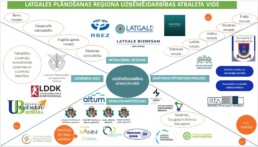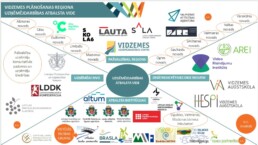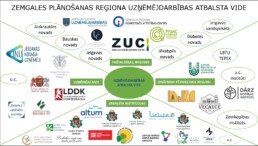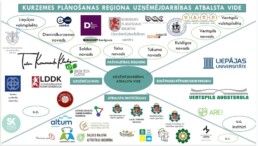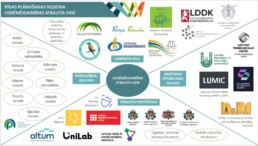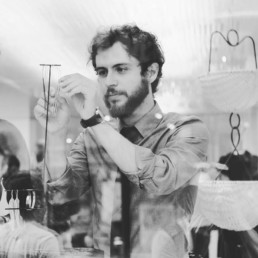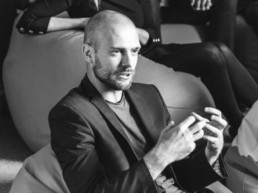Regional Think Tanks for social entrepreneurship development
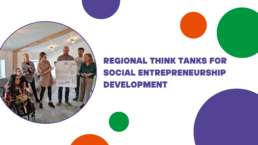
REGIONAL THINK TANKS
The social entrepreneurship ecosystem comprises a variety of stakeholders who together create a strong and supportive environment for the development of social enterprises. Strengthening this ecosystem is important as it fosters sustainable and socially impactful entrepreneurship that generates positive impacts for both society and the environment. In order to promote understanding and involvement of all stakeholders in strengthening the social entrepreneurship ecosystem, we bring together in regional think tanks opinion leaders, entrepreneurs, representatives of different organisations and municipalities with the will, opportunity and resources to strengthen and develop social entrepreneurship in the region, as well as social entrepreneurs themselves. The aim of the Think Tanks is to understand the role of each stakeholder and to prepare concrete action plans (actions here and now, not visions of the future) to strengthen and develop social entrepreneurship in each region.
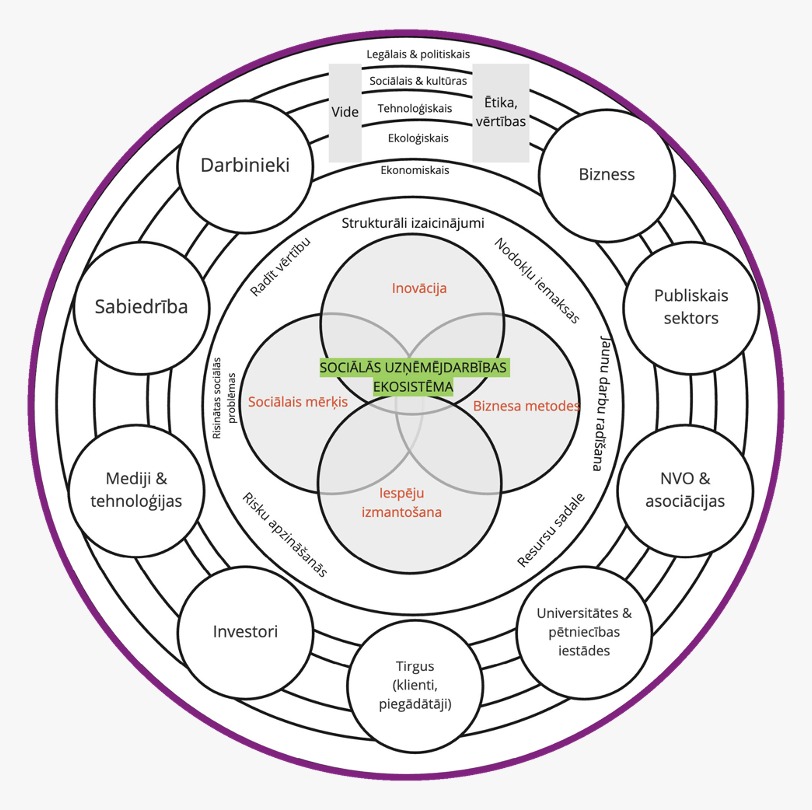
AN ACTION PLAN FOR STAKEHOLDERS
During the workshop, each stakeholder – policy makers, support organisations and social enterprises – developed an action plan for themselves and for other stakeholders for the development of social entrepreneurship with concrete actions. We summarised what was said in the regional think tanks in a common way.
- Include social entrepreneurship in current planning documents and follow up their implementation; Prioritise social entrepreneurship in planning documents
- Smart” financial resources to motivate social enterprises (grants, etc.)
- Implement socially responsible public procurement
- Delegation of national/municipal functions and services to social enterprises
- Information support (campaigns, etc.), Implement marketing activities, Provide information support; Information campaigns on social entrepreneurship in general and on social enterprises.
- Reducing administrative barriers; Reducing bureaucracy
- Educating national/municipal staff on social entrepreneurship
- Allow social enterprises to share part of their profits
- Encourage changes in legislation – tax policy (reduction of social security contributions); Improvement of tax policy (GST; labour taxes; generally tax rigid); Additional state support – tax incentives and reduction of red tape;
- Support for employment of target groups; Reduction of labour costs
- Improving the definition of a social enterprise – could reconsider whether social enterprises can only be LLCs; complicated process and no consensus; Allow associations to be granted social enterprise status.
- Implement business support programmes
- Political will
FOR LOCAL GOVERNMENTS
- Identify the social needs and problems in their territories, define the needs that can be delegated to social enterprises.
- Identify existing resources to address social problems; Identify available vacant real estate in municipalities and inform about the possibility of using it for social enterprises, Identify infrastructure(s) that can be offered to social enterprises for use; Ensure availability of infrastructure
- Delegate / transfer municipal functions to social enterprises
- Inform the public about social entrepreneurship opportunities, organise training
- Provide social enterprises with funding, tax breaks and various resources for free use
- Include points on social entrepreneurship in municipal funding competitions;
- Support programmes in municipalities or grant programmes for social enterprises.
- Promote social entrepreneurship on municipal channels – websites, social networks, etc.; Promote support and
- good stories of social enterprises on municipal communication channels
- Organise training for different social entrepreneurship organisations (both LLCs and associations)
- Financial support – tax incentives, grants, socially responsible public procurement
- Organise networking events
- Practice socially responsible procurement
- Proactively provide support and necessary information to social enterprises
FOR SUPPORT ORGANISATIONS
- Include specific support for social enterprises in organisations’ strategies
- Develop closer cooperation with the Latvian Social Entrepreneurship Association and social enterprises – meetings, events; promotion of the LSUA annual pitch competition “TAM LABAM BŪS AUGT”
- Promote social enterprises and encourage knowledge exchange; Promote good practice examples; Promote social entrepreneurship and social enterprise products on own channels
- Inviting social enterprises to guest lectures at universities to share experience stories; Organising meetings at LIAA business incubators on social entrepreneurship; ALTUM consultations for social enterprises; Cooperation with business associations – LIAA business incubators, LLKC, Kurzeme NGO Centre
- Information campaign on social entrepreneurship in a particular region / city by local authorities and partners
- Promotion of social entrepreneurship – idea creation workshops; Seminar series on opportunities in social entrepreneurship (cross-sectoral cooperation); Educational, informative events for citizens, entrepreneurs, students; Success, experience stories “Social entrepreneurs compass”, Social entrepreneurship festival; ZUK; Social entrepreneurship ideas competition; Creation of idea bank; Creation of educational offer package on social entrepreneurshipProvide new knowledge and consultations to social entrepreneurs; Provide consultations, mentors; Organise trainings for social entrepreneurs; Mentor a social entrepreneur for at least 1 year (if there is funding for such activity); Quick consultations by phone – LIAA business incubators, LLKC, Kurzeme NGO Centre;
Legal advice (if there is funding for this activity); Mentoring sessions - Establish/facilitate dialogue between social entrepreneurs and clients
- Networking – promote exchange of experience of social entrepreneurs abroad; Organise various networking events, e.g. business breakfasts for social entrepreneurs in cooperation with entrepreneurs, local action groups and ALTUM; Organise networking events – partnerships, LIAA business incubators, NGOs; social entrepreneurs matchmaking
- Take responsibility for the commitments/targets written in the project applications (net turnover growth, job creation, etc.)
- Support existing enterprises to develop a new social service (by giving these enterprises a separate NACE code in addition to the social activity)
- Funding for projects to promote and support social entrepreneurship – partnerships, LLKC, ALTUM; project opportunities; Promote the development of social entrepreneurship in project competitions, prioritise it – include it in evaluation criteria, higher intensity of support
- Implementation of studies
FOR SOCIAL ENTREPRENEURS
- Cooperation with local authorities; Develop cooperation with local authorities and NGOs
- Knowledge development; Educate the public and yourself about social entrepreneurship; Encourage others
- Share experiences; Share your experience and knowledge
- Build and strengthen community, promote participation; Visit villages; Networking
- Promote your visibility (need support for marketing activities); Speak up; Use the social enterprise brand (logo “Social Entrepreneur” developed by the Ministry of Welfare)
- Clearly define your product and service offering; Highlight and communicate your social impact; Achieve and highlight social objectives (more support needed);
- Develop social entrepreneur DNA – identify societal wellbeing needs; strengthen business model / how to monetize; develop and maintain external image; promote successful businesses and collaboration models; value choices – promote socially responsible choices in society; long-term strategic support needed
- Develop and promote industry lobbying
- Be very specific about your needs to both policy makers and support organisations
- Establish a regional advisory board for social enterprises to facilitate cooperation with local authorities; Continue to pursue its objectives through mutual cooperation in the region
- Maintain and improve the work skills of people with disabilities
- Don’t forget about profit! 🙂
- STRUGGLE while resources are not “burnt out”; Continue to be these “amazing people”; KEEP DOING! 🙂
Pay workers salaries; Raise the prestige of professions (e.g. carer)
BENEFITS & NEXT STEPS
After each of the Think Tanks, we invited the stakeholders to give their assessment of the experience, as well as concrete actions that the participants plan to implement to develop social entrepreneurship in their daily lives, as well as future actions needed.
- New insights and ideas; Get a feel for the current situation in the sector to draw conclusions on the acute situation; Gain more knowledge on the topic of social entrepreneurship, get ideas for future work and get to know different interest organisations; Become clearer what social entrepreneurship is and what it can bring to society and to the entrepreneur himself; Opportunity to understand how other municipalities are doing in this field
- Meet people from other sectors than social entrepreneurs; Meet other social entrepreneurs and associations; New contacts, knowledge; Opportunity to meet and talk about topical issues
- New contacts, concrete plans for future cooperation; Mutual contacts and meetings; Getting to know colleagues in other municipalities; Finding a cooperation partner; Getting to know new social enterprises, discussing cooperation opportunities
- Overview of stakeholders, perception of the attitude, understanding of state and municipal representatives; what kind of support is available, vision of social entrepreneurs themselves, expectations
- I realised that I am not the only “crazy one” who is not really making money from social entrepreneurship with the existing conditions to run and develop the organisation
- I have gained the point of view and perspective of the entrepreneurs themselves, which helps me to better understand what they expect from support institutions and how we can help them; Clearer understanding of what we can do as an institution for the development of social entrepreneurship; I have learned more about what support institutions still provide
- My benefit was definitely the informal atmosphere on a Friday, on a working weekend, super positive atmosphere, bright, good, determined people! The presentations of the SU tables themselves were very impressive, big, big malachi! So the benefit is that I really learnt a lot of new things, got inspired by the SUs themselves and hats off to you, LSUA, as organisers! You did it, I felt like I was amongst my own people, thank you very, very much and have a great rest of the year!
- I have a clear task that I plan to implement in the coming year to improve the social enterprise ecosystem.
- Practical lessons from partners and recommendations for improving social entrepreneurship policy and developing support instruments.
How will you use the action plan developed in the Think Tank?
- More cooperation with other social enterprises in your region
- For work purposes, in conversations with entrepreneurs; In our daily work; We will try to incorporate the guidelines into our daily work
- Where possible, include actions supporting social entrepreneurship in the strategy of the Local Action Group; Evaluate and incorporate into near or distant objectives.
- Always take into account the actions and proposals developed by the different working groups and plans; Take into account when planning actions to promote social entrepreneurship; Use the action plan in future work, when developing the development strategy; When planning work; Include the action plan in the activities planned by the organisation; Use within the organisation and with the municipality
- In our own municipality we will continue the 1st step we have just started – meeting our social entrepreneurs, the 2nd step will be visiting them and getting to know each other
- I will share the information with my colleagues and stimulate a discussion on how to improve the support measures for social entrepreneurship.
- Activities for implementation, ideas for projects
- Work in the Interreg Europe project; new project ideas, linking with the RPR Development Programme Action Plan 2021-2027
- Negotiation with the municipality
- I will definitely use in the future to strengthen links with business and support institutions.
- The Action Plan is more useful for broadening the horizon, so to speak, for understanding the SU ecosystem, and that is not a small thing.
What kind of further social entrepreneurship activities would be most useful to you?
- Outreach to entrepreneurs who would like to follow this path; Outreach on support opportunities – I understand that social entrepreneurs are concerned about a fairly near future in their field; Outreach, practical training
- Statistics on existing social enterprises, dynamics of registration/ dissolution, use of financial instruments (from Altum) and fulfilment/non-fulfilment of project commitments
- Regional meetings for social entrepreneurs and stakeholders to strengthen them; Stories from social entrepreneurs’ own experiences (positive and negative) to inspire and learn from mistakes
- Camp
- Events to educate entrepreneurs in the territory of the Society’s activities, organised in cooperation with the Latvian Social Entrepreneurship Association.
- Stories of social enterprises’ experiences and different municipalities’ views on the role of social enterprises (support or not and if not, what is missing?)
- Shadowing events
- Networking, exchange of experience; Information exchange, networking
- Meetings with experts who can help with concrete recommendations for the implementation of the action plans of the following think tanks
- Continue with this format of cross-sectoral think-tanks, as I think that very important issues were raised, it was important to hear the perspectives of the stakeholders, so it is worth continuing with these events in the future
It is important to exchange experiences beyond the borders of the LV as well, for the representatives of the - Ministry, support organisations and social enterprises, in order to understand that we need to spend less resources on standing out and more on investing in the people who do the work
- All is well and will be well, good luck to you!
Regional Think Tanks were held as part of the Ministry of Welfare’s Social Entrepreneurship Activity Series “Developing Social Entrepreneurship Together!” funded by the European Social Fund. The diverse activities of the cycle, planned to strengthen and develop the social entrepreneurship ecosystem in Latvia, will run until November 2023. They are implemented in cooperation with sector organisations – the Latvian Social Entrepreneurship Association, the associations “New Door”, “Reach for Change Latvia” and the social enterprise “Visas Iespējas”.

